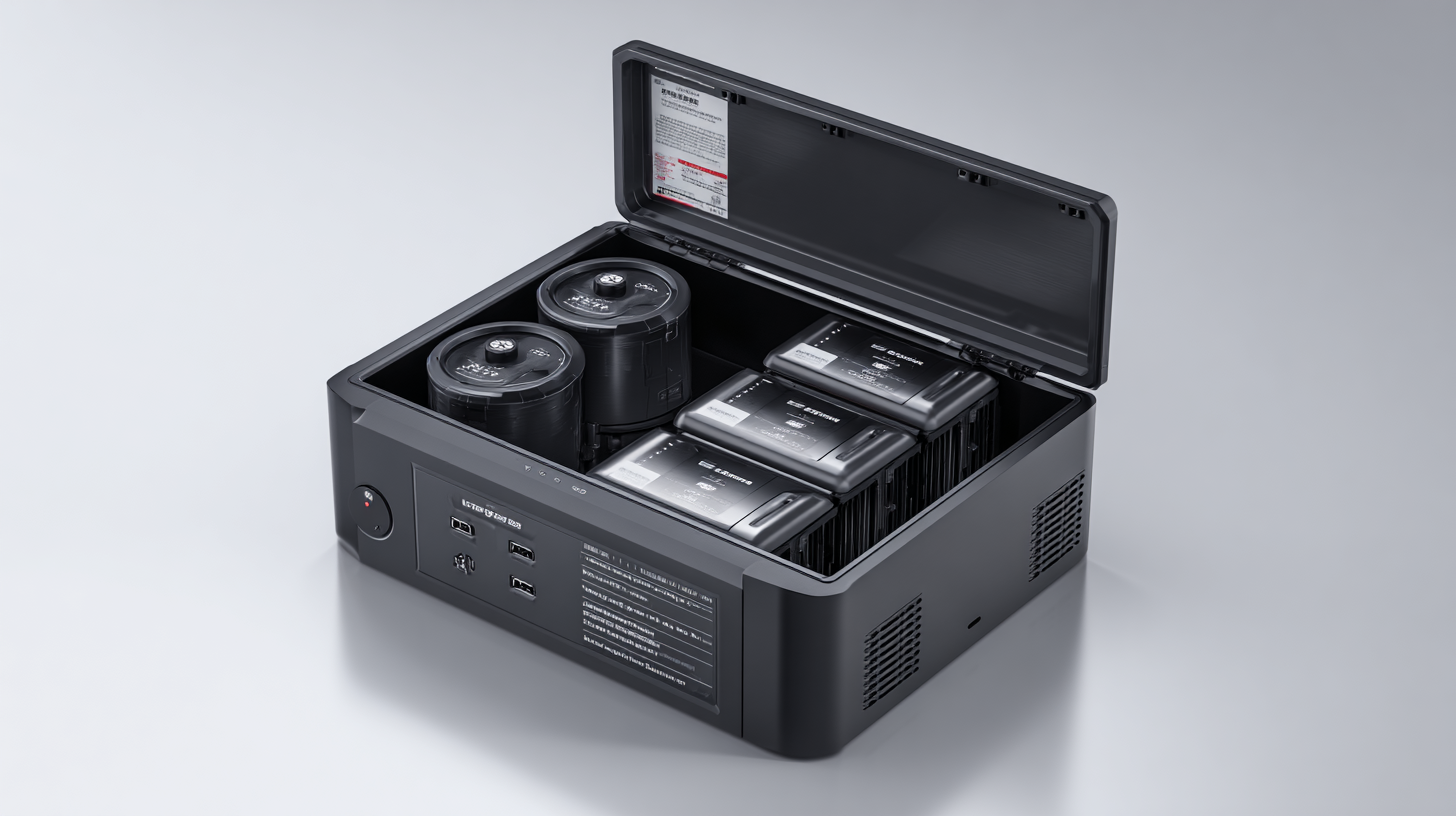Blog
Exploring the Unique Features and Applications of Best Ups Power Backup Solutions
In an era where downtime can lead to significant financial losses, the importance of reliable UPS Power Backup solutions cannot be overstated. According to a report by MarketsandMarkets, the global UPS market is projected to reach USD 15.2 billion by 2025, growing at a CAGR of 6.8%. This growth is driven by the increasing demand for uninterrupted power supply, particularly in critical sectors such as healthcare, IT, and telecommunications. With power outages being a common occurrence, the right UPS system not only safeguards sensitive equipment but also ensures business continuity. As organizations increasingly recognize the need for robust power backup systems, exploring the unique features and applications of the best UPS Power Backup solutions becomes essential. This blog will delve into the various benefits of high-quality UPS systems, highlighting how they can enhance operational efficiency and protect valuable assets.

Understanding the Importance of UPS Power Backup Solutions for Modern Businesses
In today's fast-paced digital landscape, the significance of UPS power backup solutions for modern businesses cannot be overstated. The global UPS market is projected to reach $837.2 million by 2025, with rapid growth to $1.172 billion by 2033, reflecting a compound annual growth rate of 4.3%. This surge highlights the increasing reliance of businesses on uninterruptible power supply systems to ensure operational continuity and data protection.
As data centers evolve, energy storage solutions are playing an integral role. The global data center energy storage market is expected to expand from $1.39 billion in 2023 to approximately $2.33 billion by 2031, driven by a compound annual growth rate of 6.76%. This growth underscores the essential nature of reliable power systems in safeguarding critical data infrastructure.
**Tips:** Businesses should assess their power backup requirements based on their size and industry demands. Investing in modular or scalable UPS systems can provide flexibility and efficiency in managing energy needs. Additionally, regular maintenance and testing of UPS units are crucial to ensure their reliability during unexpected outages. A thorough understanding of battery technologies can also lead to better decision-making when selecting energy storage solutions.
Exploring the Unique Features and Applications of Best UPS Power Backup Solutions
| Feature | Description | Application | Importance |
|---|---|---|---|
| Voltage Regulation | Maintains consistent output voltage to protect sensitive equipment. | Data centers, hospitals, offices. | Prevents data loss and equipment damage due to voltage spikes or drops. |
| Automatic Shutdown | Safely powers down equipment during extended outages. | Industrial, educational institutions, research labs. | Protects data integrity and prevents hardware damage. |
| Extended Run Times | Allows for additional battery packs to be connected for longer backup duration. | Telecommunications, emergency services. | Ensures critical systems remain operational during long outages. |
| Surge Protection | Prevents voltage surges from damaging connected devices. | Home office, small businesses. | Protects investments in electronic equipment. |
| Remote Monitoring | Enables tracking of power status and health of the UPS remotely. | Data centers, managed service providers. | Facilitates proactive management and troubleshooting of power issues. |
Key Features of Top-Quality UPS Systems: What You Need to Know
When selecting a UPS (Uninterruptible Power Supply) system, understanding its key features is crucial for ensuring optimal performance in critical applications. One of the primary characteristics to consider is the power capacity, measured in VA (volt-amperes), which determines the amount of equipment the UPS can support. A high-capacity UPS is essential for handling power demands from multiple devices, especially in server rooms or data centers where downtime can lead to significant losses. Additionally, the type of UPS—online, offline, or line-interactive—affects its ability to provide consistent power quality.
Another critical feature is the transfer time. The best UPS systems provide an instantaneous or near-instantaneous transfer to battery power during an outage. This is vital for sensitive electronic equipment that is susceptible to even brief interruptions. Furthermore, battery runtime is an important factor; systems should offer sufficient backup duration to ensure operations can either continue seamlessly or allow time for a safe shutdown. Advanced UPS systems also include monitoring and management capabilities, which allow users to track power usage and battery health, ensuring proactive maintenance and minimizing the risk of unexpected failures.
Power Backup Solutions: Capacity vs. Runtime
Diverse Applications of UPS Power Backup: From Data Centers to Home Offices
Uninterruptible Power Supply (UPS) systems have become essential in various environments due to their ability to provide immediate backup power during outages. In data centers, where data integrity and uptime are paramount, UPS systems ensure that servers remain operational. These systems not only keep critical infrastructure running but also provide enough time for a safe shutdown, preventing data loss and hardware damage. The advanced technologies in UPS units allow for seamless transitions between main power and backup, thereby safeguarding sensitive information against interruptions.

Similarly, in home offices, UPS power backup solutions offer peace of mind to remote workers. Sudden power cuts can disrupt productivity and lead to the loss of valuable work. With a UPS in place, professionals can continue their work uninterrupted, maintain communications, and finalize tasks before shutting down safely. Additionally, smaller UPS models designed for home use are now equipped with features like surge protection and energy efficiency, making them ideal companions for computers, routers, and other essential devices. The versatility of UPS systems across diverse environments exemplifies their critical role in today's technology-driven lifestyle.
How Chinese Manufacturing is Leading the Way in UPS Innovations
China's manufacturing prowess has taken the lead in the development of Uninterruptible Power Supply (UPS) technologies, particularly as the global demand for reliable power backup solutions surges. Chinese companies are at the forefront of battery technology advancements, playing a pivotal role in refining UPS systems that are more efficient and durable. This innovation is driven by a combination of extensive research and development, state support, and an increasingly competitive market that fosters dynamic start-up ecosystems.

Tips for selecting the right UPS technology for your needs include assessing the load capacity required, understanding the runtime needed during outages, and considering features such as automatic voltage regulation. Evaluate different UPS models to find one that suits your operational requirements while remaining energy-efficient.
Furthermore, the emphasis on sustainability has prompted many Chinese manufacturers to integrate environmentally friendly practices into their UPS production. By focusing on eco-conscious designs and materials, these manufacturers not only meet regulatory standards but also appeal to a growing market of environmentally aware consumers. Always check for certifications and energy efficiency ratings when choosing a UPS solution to ensure that it aligns with your sustainability goals.
Future Trends in UPS Technology: What to Expect in Power Backup Solutions
The landscape of uninterruptible power supply (UPS) technology is on the brink of significant advancements. Current market research indicates that the global UPS market in the Asia-Pacific region alone reached approximately $530.12 million in 2023, with projections suggesting it could grow to $1.1 billion by 2032 at a compound annual growth rate (CAGR) of 9.2%. This surge can be attributed to the increasing demand for reliable power solutions across various sectors, particularly in data centers, where seamless power backup is critical for operational continuity.
Moreover, as data centers expand, the need for innovative UPS systems becomes paramount. The global data center UPS market is anticipated to grow from $6.12 billion in 2025 to an impressive $10.29 billion by 2032, showcasing a CAGR of 7.7%. Companies are prioritizing UPS designs that integrate advanced technologies, such as hybrid solutions that combine supercapacitors with battery backup units to optimize efficiency and reliability. These developments strategically align with the growing trend toward sustainable energy solutions in response to the explosive data demands of the digital age, ultimately shaping the future of power backup systems.
